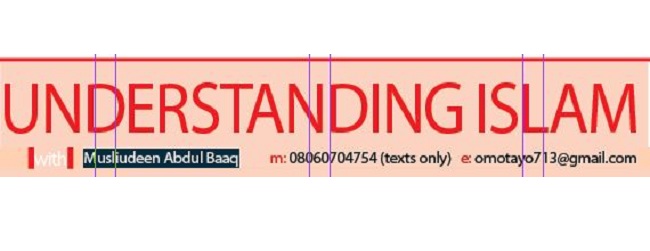Early Muslim women of exemplary virtues
THE early period of Islam was replete with iconic women of substance who impacted their societies. Contemporary Muslim women who desire to meet Allah (SWT) on the Day of Reckoning should emulate these women of faith who demonstrated very high level of uprightness and piety. These women of honour went about discharging their duties traditionally as wives to their husbands, mothers to their children, daughters to their parents, even as integral parts of the societies in which they lived in their eras. For the purpose of exemplification, a number of these Muslim women are considered today.
Ansau
Ansau was of the white-skinned Arabs extraction. She was highly knowledgeable in hisab (arithmetic).
Usama
Usama was famously acknowledged in her time as a trustworthy woman. Her truthfulness on all matters was exemplary to others.
Nana Fatimah bint’ Rosulullahi
Nana Fatimah Bint Rosulullahi was also called Tayyibat. She was learned in fiqh (Islamic jurisprudence) and on topics bordering on Islam. She was endowed by Allah (SWT) in matters of spirituality and metaphysics such that she could listen to a dying camel that belonged to the Prophet on a particular occasion.
Nana Aisha (R.A.)
Nana Aisha (R.A.) was a mentor and teacher of great repute such that the Prophet (SAW) would assign many mentees to learn religious ethics and principles under her tutelage. She demonstrated absolute faithfulness towards the Prophet as a wife. She would frequent the very enclosure where the Prophet (SAW) and the first Caliph, Abubakr (R.A.), who was her father, were interred. She used to frequent the enclosure as a matter of duty. However, she stopped visiting the place at the moment Caliph Umar (R.A.) too was interred in the same enclosure. Nana Aisha (R.A.) decided to stop visiting the place because Caliph Umar (R.A.) was not supposed to have knowledge of her privacy, even in death! Such was the height of Nana Aisha’s sense of faithfulness and chastity as a woman. She remains a role model to all women and girls who aspire to reach a high degree of piety.
Zulaekha
The name ‘Zulaekha’ is wrongly pronounced as ‘Suliyat’ by some Muslims and non-Muslims. She was wife to Prophet Yusuf (A.S.). She demonstrated genuine affection towards Prophet Yusuf (A.S.) after she had been forgiven of her iniquities at the time she was queen to the paramount ruler of Misra. She ensured that she was guided by dictates of Shari’ah in her dealings with Prophet Yusuf (A.S).
Rahmata
Rahmata was wife to Prophet Ayyub (A.S.). She is reckoned with in this class of women for her steadfastness and service to her indisposed husband, Prophet Ayyub (A.S.). With all she had, Rahmata stood by her husband and gave him utmost attention, despite the hopelessness of the protracted illness of Prophet Ayyub. She encouraged her husband not to shed a bit of his faith in Allah (SWT).
Ummuh Salamat
Ummuh Salamat was also named Asmau. She was wife to Prophet Muhammad (SAW). She was reputed for her deep knowledge of Islam. Ummuh Salamata was conferred with the title ‘Faqihat’ (the knowledgeable one on Shari’ah). Ummuh Salamata was the pioneer of the dress code for the Muslim woman in prayer.
Rabiat al-Adawiyyah
This exemplary woman had an unshakable faith in Allah (SWT). She was never let down by Allah (SWT) so much so that it was reported that locusts had eaten up the entire farmlands in her country. The bad news was brought to her but she took the news with utmost equanimity, but made it very clear to the people around her that own farmland was not affected by the misfortune.
It was actually confirmed by all and sundry that Rabiat al-Adawiyyah’s farmland and the crops on it were intact while others in the country were all gone with the calamity. News went far about her excellent faith in Allah (SWT). Rabiat al-Adawiyyah was honoured as the Ameerah (spiritual leader of all Muslim women) in her era.
Safiyyah
Safiyyah was a philosopher of note who authored many religion-based publications in her time.
Zahrah
Zahrah was the elderly wife of Prophet Ibraheem (AS). She was reputed for her goodness towards her husband, Prophet Ibraheem (A.S). Zahra was credited for pioneering the use of women ornamental jewellery in an ironic twist. She had imposed the use of earrings, necklace, tattoos with ink dyes, etc, on Hajarah, whom Prophet Ibraheem (AS) took as second wife much later. Zahrah had, out of jealousy and envy, schemed to render Hajarah unattractive to her husband, hence she imposed the use of jewellery on her slave-girl, Hajarah, who ironically became second wife to Prophet Ibraheem (AS). Women in Ummah should endeavour to learn the good lessons on being excellent women in their efforts towards causing their husbands to be pleased with them.
In other words, they should be caring and loving. However, they must shun unhealthy rivalry among themselves, particularly with their co-wives, because doing this will definitely have a backlash. It is Allah’s divine provision in Shari’ah for Muslim men to marry one, two, three or four women as they may wish, although there are terms and conditions for the men to abide by. But women should always strive to be peaceful at all times with the co-wives in their matrimonial homes.
Hajarah
Hajarah was the second wife to Prophet Ibraheem (A.S.) and mother to Prophet Ismaheel (A.S). She was a slave-girl who suffered bitter experiences at the hands of her mistress, Zahrah. Hajarah persevered a lot with patience and prayers. Her perseverance was noted by Allah (SWT) Who blessed her with unimaginable success stories. She was put down continually by Zahrah, her mistress and co-wife. However, all evil intentions against her were turned in her favour. Muslim women should learn to be strong in the face of trial, believing faithfully in Allah (SWT) for intervention.
Muti’ah (Mutiat)
Muti’ah was well versed in the Qur’an. A story had it that she vowed not to communicate with anyone throughout a time she was on pilgrimage to Makkah and Madinah in any other language than Arabic. She had to climb a camel without the people around gazing at her as she climbed, and she then quoted Surat 24 Ayaht 30 (Nur 24:30). The Ayaht admonishes the true believers who are Muslims to lower their gaze. And as she recited the portion of the Qur’an, people around her turned away their gazes in respect for the commandment of Allah (SWT). This was one of the numerous episodes whereby Nana Muti’ah employed the Qur’an to engage people in audience.
Hafsah bint’ Umar
She recited the Glorious Qur’an in her time to the best standard which was approved of as the yardstick by Caliph Uthman. Hafsah bint’ Umar’s recitation standard is today reckoned with as one among some eleven models for Qur’an recitation. The graphic endorsement of Caliph Uthman on the Qur’an is a lasting legacy attributable to Hafsah bint’ Umar.
Mubriul-Jaral
She singlehandedly helped her mother from the entanglement of slanders by her detractors. It was because of her great deeds that Surah Buruj (Qur’an Chapter 85) was revealed.
Khaulah bint’ Thaalabat
This was a woman whose invocations were heard and acknowledged in the High Heavens by Allah (SWT), even though they were not heard by men and women on earth. Allah (SWT) consequently revealed Surah Al-Mujadilah (Qur’an Chapter 58), where He declares that: “Indeed Allah has heard the statement of her (Khaulah bint Tha’labah) that disputes with you (O Muhammad (SAW) concerning her husband (Aus bin As-Samit) and complaints to Allah.”
Balqis
She was a very influential ruler of an empire, a queen who relinquished her throne for Allah (SWT) through Prophet Sulaiman (A.S). The lesson here for our women in the Ummah is that those whom Allah (SWT) graciously endowed with riches, beauty, influence and power should always be conscious of the dictate of Allah (SWT). Muslim women must submit themselves to their husbands, no matter the power or influence they may wield.
Ummuh Atiyyah
Ummuh Atiyyah was the first woman in purdah to attend the congregational Eid prayer during the lifetime of the Prophet (SAW). Ummuh Atiyyah also went a step further by making Sodakoh (willing and cheerful act of giving out to the needy) a veritable way of life. Modern-day women in Islam should cultivate Ummu Atiyyah’s character. They should be enthusiastic about all acts of ibaadah (acts of worship towards Allah (SWT). We should all endeavour to reach out to those who lack the basic necessities such as food, clothing, shelter and money.
READ ALSO FROM NIGERIAN TRIBUNE






